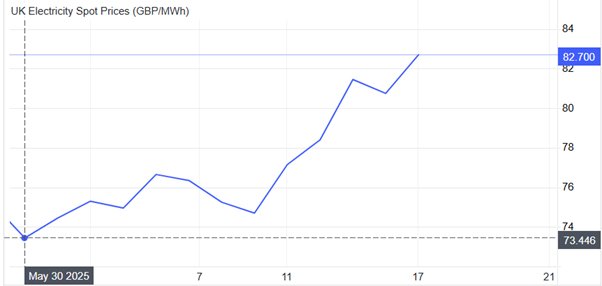As if global commodities markets hadn’t had enough disruption in recent years, the Israel and Iran conflict has added a new dynamic to market behaviour.
NOTE: before we go further in this analysis, we want to recognise that the primary concern should always be for the tangible effects on human life in conflict scenarios.
To make rough predictions about the directions the UK gas and electricity markets will take, it is important to understand how the UK energy market works. You can read our guide to the UK energy market here. But, to summarise, we will explain the ways in which the price businesses pay is affected by global macroeconomic events.
How the UK Energy Market Works
In the UK, we are a net importer of energy, whether that’s through interconnectors with neighbours such as France, or via the purchase of materials used to generate power, such as natural gas. This means we can not meet our energy needs through our capacity to generate alone. We need to import.
The UK is at the mercy of the global wholesale markets, more so than a net exporter such as Norway or France or many Middle Eastern countries.
When Russia invaded Ukraine in 2022, this highlighted our position as a net importer as a significant weakness. The government acted by fast-tracking many generation projects such as wind turbines and nuclear installations, but these will not be operational for many years.
So, we have to generate as much power as we can, then fulfil the rest of our needs by importing.
“Despite relatively low energy demand, reduced energy production meant that net import dependency increased to 43.0 per cent in 2024 from 40.8 per cent in 2023 with electricity imports increasing significantly on 2024. Norway and the US were the principal sources of the UK’s imported energy in 2024.”
How will the situation in Israel and Iran affect the UK market?
Supply and demand is likely a familiar concept to most people involved in business. If there is a scarcity of natural gas, the commodity becomes more valuable.
The prices energy suppliers deliver to customers will obviously consider wholesale market dynamics. If they expect the market to be scarce, their prices will be higher.
Therefore, disruption to supply is a major factor when suppliers are forward planning.
Destruction of infrastructure, disruption to transport and loss of life will all have significant impacts on the delivery of vital resources to the global energy and commodities markets.
So, a sensible approach is to apply the following rule: the higher the escalation of the situation, the higher the wholesale price is likely to be.
You can see from the graph below, courtesy of tradingeconomics.com, that the UK spot prices of electricity have risen 12% in June so far.

Iran borders a key global transport route: the Straight of Hormuz. More than a quarter of the world’s liquid natural gas (LNG) passes through this zone from Qatar, UA and Oman (Gulf Times).
Delayed transport times, increased shipping insurance premiums and disrupted operations will all lead to reduced availability of LNG and increased prices. Equally, Iran is one of the world’s largest oil producers, which is used in all kinds of energy production.
How gas affects electricity
Electricity has to be generated. This can be done via renewable sources, low carbon or by using fossil fuels.
In 2024, 25.9% of our electricity was generated using gas, whilst 13.7% was nuclear and coal was as low as 0.6%. 35% was purely renewable.
So you can see the importance of gas, both as a direct fuel for commercial and residential buildings, but also in the generation of electricity. Therefore, the electricity market correlates at a high level with the gas market.
Suppliers must make a call on future policies for Israel and Iran
If suppliers think that the conflict will continue to escalate or that there will be further repercussions across a key region for the world’s natural resource supply, they will build more risk into their future pricing.
This will impact longer term prices.
Running a successful energy supplier, therefore, can come down significantly to the quality of the business’ hedging strategies.
Whilst few businesses will harbour particular sympathy for suppliers over recent years due to major price rises and news reports of executive pay packets, hopefully this blog demonstrates how difficult it can be for them to set pricing and how much of it is a calculated risk.
Are you concerned about energy prices affecting your business?
We can help you create a future-fit energy strategy, shielding your business as much as possible from outside volatility, supply security issues and price increases.
Speak to any of our experts for free advice and consultancy.
You can also run an online quote using our switching tool, Switch Savvi.

